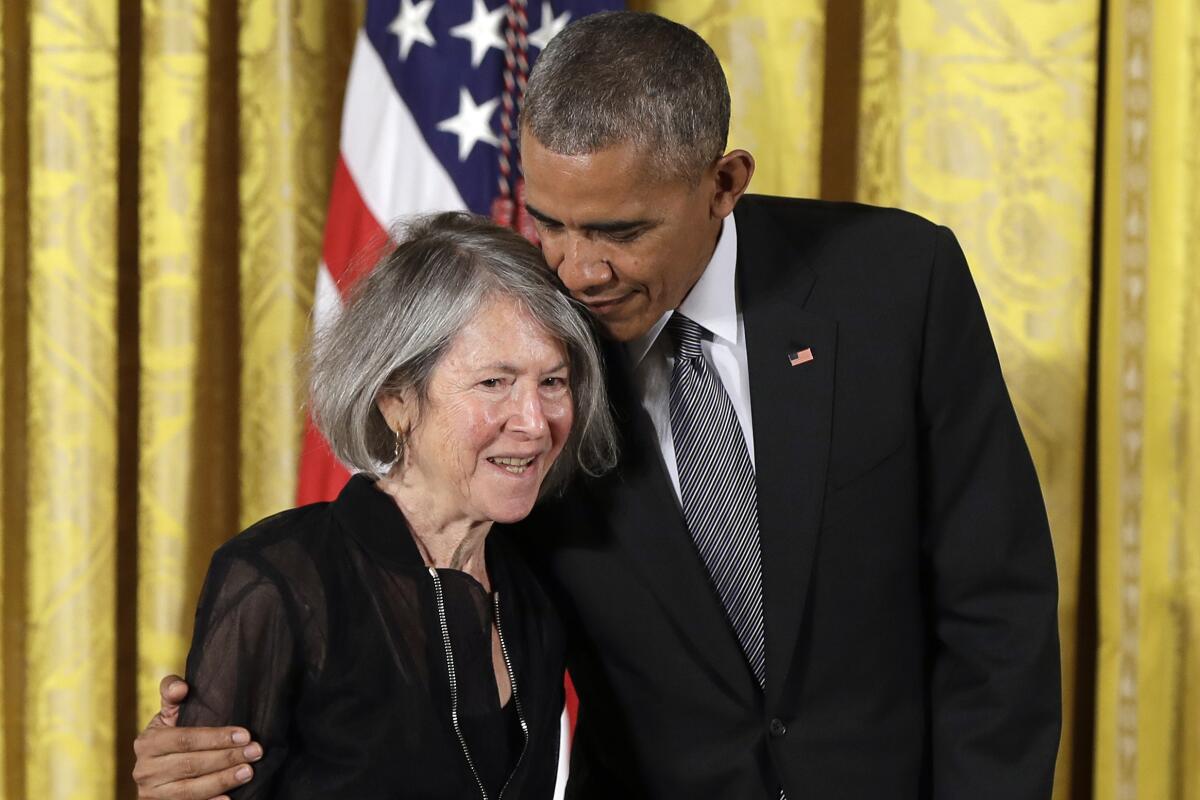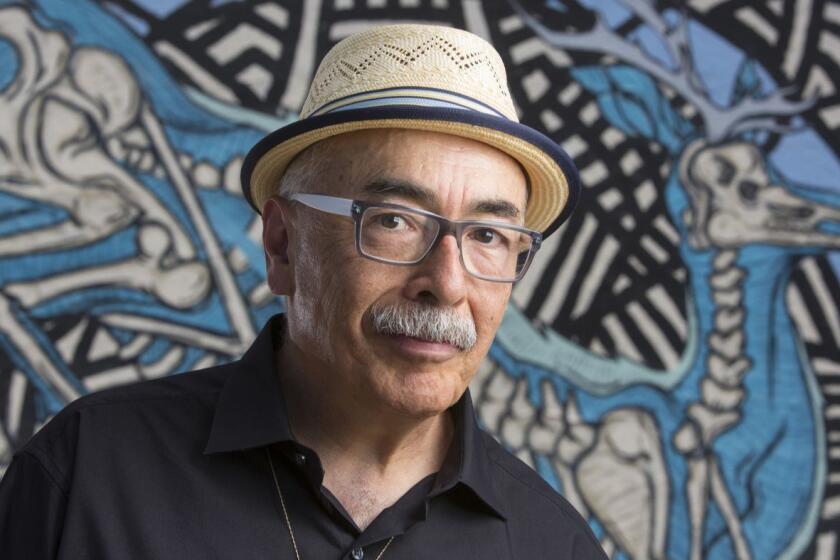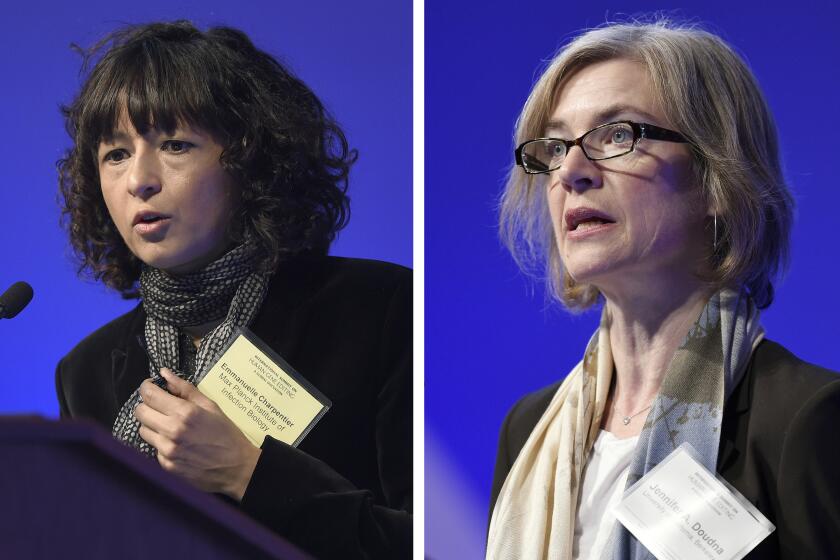Former U.S. Poet Laureate Louise Gluck wins Nobel Prize in literature

LONDON — The 2020 Nobel Prize in literature has been awarded to former U.S. Poet Laureate Louise Gluck.
The prize committee cited “her unmistakable poetic voice that with austere beauty makes individual existence universal.” Gluck is the first American woman to win the award since Toni Morrison in 1993.
The prize was announced Thursday in Stockholm by the Swedish Academy.
Gluck, 77, joins a glittering list of literary giants and previous Nobelists who include, in this century, Canadian short-story master Alice Munro, British novelist Kazuo Ishiguro, Chinese magical-realist Mo Yan, Peruvian writer Mario Vargas Llosa and Turkish author Orhan Pamuk.
Gluck’s work includes 12 collections of poetry and a couple of volumes of essays on literary writing. “All are characterized by striving for clarity. Childhood and family life, the close relationship with parents and siblings is a [theme] that has remained central to her,” Anders Olsson, the chairman of the Nobel Committee for Literature, said.
“She seeks the universal, and in this she takes inspiration from myths and Classical motifs,” Olsson added, citing her 2006 collection “Averno,” which the committee described as “masterly” for its “visionary interpretation of the myth of Persephone’s descent into hell in the captivity of Hades, the god of death.”
Her predecessors took part in high-profile initiatives to promote the art form, but expect the intensely private Louise Gluck to follow her own course.
A professor at Yale and a resident of Cambridge, Mass., Gluck served as U.S. poet laureate from 2003 to 2004 and is no stranger to accolades. She won the Pulitzer Prize in 1993 for her collection of poems titled “The Wild Iris,” in which “she describes the miraculous return of life after winter in the poem ‘Snowdrops,’” the Nobel literature committee said Thursday. She also won the 2014 National Book Award for poetry for “Faithful and Virtuous Night.”
In 2016, President Obama bestowed the National Humanities Medal on Gluck in a White House ceremony.
Mats Malm, a Nobel literature committee official, said that he contacted Gluck with news of her win and that “the message came as a surprise — but a welcome one, as far as I could tell,” given the early hour on the U.S. East Coast.
The publicity-shy Gluck did not immediately issue any comment about the latest tribute to her body of work, which spans more than half a century. In a 2012 interview, she acknowledged that prizes can make “existence in the world easier” but did not amount to the immortality of a true artist.
L.A. poet laureate Robin Coste Lewis joins the L.A. Times Book Club Sept. 24 for Black Poets in a Time of Unrest, an evening of discussion and poetry performances.
“I want to live after I die, in that ancient way,” she said. “And there’s no way of knowing whether that will happen, and there will be no knowing, no matter how many blue ribbons have been plastered to my corpse.”
The remark is in line with Olsson’s description of Gluck’s poetic voice as “candid and uncompromising” but frequently witty.
Her literary career began with the aptly named collection “Firstborn,” published in 1968. Other acclaimed works include “Ararat” and “The Triumph of Achilles” from 1985, which garnered the National Book Critics Circle Award.
Gluck, who attended Sarah Lawrence College and Columbia University, is a member of the American Academy of Arts and Letters.
If you’re looking to stay entertained during coronavirus lockdown, reading poetry is a whole lot easier than baking bread.
The last American to win the literature prize was an unconventional choice: Bob Dylan, whom the committee singled out in 2016 for “having created new poetic expressions within the great American song tradition.”
The literature prize has had other brushes with controversy, including complaints that the award committee has too often favored European writers. Last year, two literature prizes were handed out, one for 2019 and a belated one for 2018, following a sexual harassment scandal that engulfed the committee and forced organizers to postpone naming the 2018 winner.
Both of those most recent laureates were Europeans. The choice of Austrian writer Peter Handke as the 2019 awardee also drew criticism because of comments he has made minimizing the ethnic cleansing perpetrated by Serbian strongman Slobodan Milosevic during the Balkan wars. At least one member of the Nobel literature committee resigned over the decision to honor Handke.
However, Americans have been well-represented in this year’s round of Nobel Prizes, sharing in all three science awards before Thursday’s announcement of the literature laurel.
The Nobel Prize in chemistry is awarded to Jennifer Doudna of UC Berkeley and Emmanuelle Charpentier for their work on the CRISPR gene-editing tool.
Two American scientists were among those honored with the prize for medicine Monday for their part in discovering the hepatitis C virus, a UCLA astronomer jointly won the physics prize Tuesday for her work on understanding black holes, and a UC Berkeley biochemist was one of two women recognized Wednesday for helping to develop the revolutionary CRISPR gene-editing tool.
The Nobel Peace Prize winner will be unveiled Friday, and the award for economics will be announced Monday.
The award comes with a gold medal and more than $1.1 million, drawn from a bequest left by Swedish inventor Alfred Nobel, who established the prizes that bear his name.
More to Read
Sign up for Essential California
The most important California stories and recommendations in your inbox every morning.
You may occasionally receive promotional content from the Los Angeles Times.













